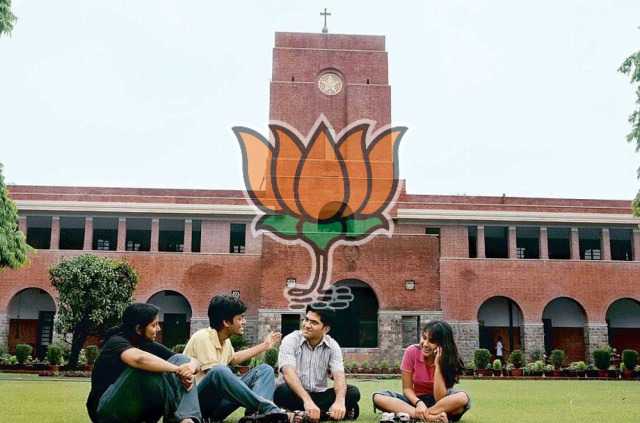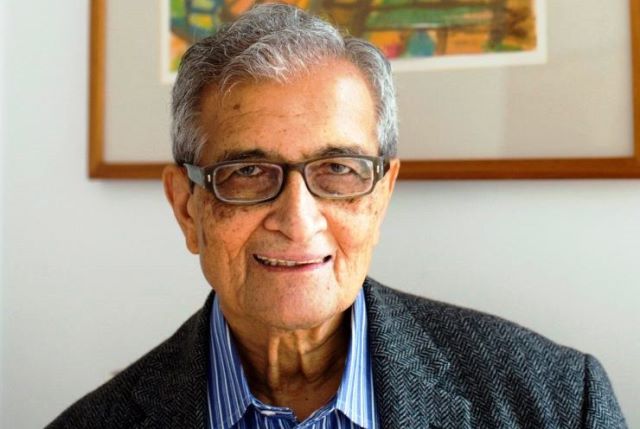The Yogi Adityanath-led Uttar Pradesh government caused an educational hara-kiri in July when it let the board of secondary education to drop the works of Rabindranath Tagore, Sarojini Naidu and RK Narayan to make room for worthies like Baba Ramdev in school curriculum.
UP is no exception to fiddling with the children’s education, cultural milieu in which they grow up and their future. In a no less shocking development, the academic council of Delhi University has decided to remove Mahasweta Devi’s universally celebrated short story Draupadi focussing on a tribal woman’s struggle against oppression and also autographical works of two Tamil Dalit writers from BA English honours syllabus. A rape scene in the story is cited as the reason for removal of Draupadi from the syllabus.
In both UP and Delhi the specious argument for deleting the classic works is that these have remained in the syllabus for a long time and the changes are routine in nature. What is, however, flummoxing about Delhi University decision is that the vice chancellor made a rare invocation of his emergency powers to bypass the executive council and brushed aside the dissenting voices in the academic council to bury Draupadi and works of Dalit writers.
These are instances of obliging academic heads and government officials bending backwards not to let the young minds exposed to liberal ideas. On the contrary, their actions are aiding the creation of an environment in all educational institutions from primary schools to universities that will draw students to majoritarianism beliefs.
Here it is important to recall that in the long years of our struggle for freedom, the leaders with Mahatma Gandhi at the helm conducted a unified, inclusive campaign where religion did not play a divisive role. The goal was to have an independent nation state that would be democratic, secular and socialist in nature. Even while from the Independence movement emerged two countries on consideration of religion, thanks to machinations of departing colonialists, majoritarianism or the concept of a Hindu state was anathema to Indian leaders of the time. However, it is nobody’s case that at any stage since Independence, the country came close to the goals enshrined in the Preamble to the Constitution – secure “justice, liberty, equality to all citizens and promote fraternity.”
At the same time, reforms to achieve these goals were made progressively, whatever the speed. Whenever reforms would become frustratingly slow, the principal sufferers are dalits, adivasis and minority communities. No wonder, the globally acclaimed historian Romila Thapar (her core area of study is ancient India) is pained by abandonment of progressive reforms in recent years. Instead, as Thapar says, what is ruling the roost now is perverted nationalism based on majoritarianism (read Hindutva). According to her, this turnabout and prospering of majoritarianism could be made possible only under authoritarian rule when entire society lives under fear. Looking back before the BJP led National Democratic Alliance (NDA) came to power in 2014, Thapar said, those were the times when one could freely speak on all issues, approvingly or critically without the fear of being persecuted or being branded anti-national.
The questions that are regularly asked in the present national context are: What constitutes nationalism and patriotism? Is one required to shout nationalist slogans such as Bharat Mata ki Jai and Jai Sia Ram to establish one’s patriotic credentials? Is not cultural freedom so sacred in a democracy getting increasingly compromised? Answers to these questions will be found in Thapr’s seminal essay ‘Reflections on Nationalism and History.’ Religious nationalism, according to Thapar and many others, played a marginal role in anti-colonial movement that resulted in a free India.
ALSO READ: JNU Is Not Going To Bend Or Crawl
Anti-colonial and secular nationalism left a major influence on writing of Indian history. But the “two-nation theory and the theory of Aryan origins are rooted in the nineteenth-century colonial interpretation of Indian history,” says Thapar. Hindus nationalists will, however, wear lenses of colonial historians to look at the country’s past. What is the choice for Indians then: Should they be shouting slogans prescribed by political leaders to prove their nationalist credentials or should they be working to establish a society that champions secular democratic values and cares for every citizen?
Public intellectuals of the eminence of Thapar, Irfan Habib and Prabhat Patnaik all believe that the fight to counter the pernicious majoritarian thoughts, the countrymen will have to be alert about what is taught at schools and colleges. Rulers of the day cannot do any fiddling with studies of science subjects or economics or geography. But society has to be alert whether the students are taught distorted history or literature that compromises secular values. According to Thapar, curriculum and syllabus are something of great importance. There are instances galore of history textbooks being written based on Hindutva related distortions of facts. Thapar has likened the development to the concerted attempts by Jesuits to implant Catholic faith among youngsters. Hindutva majoritarianism is moving in the same direction. The campaign has begun in thousands of schools.
Importance of textbooks cannot be overemphasised. In spite of this, we have remained indifferent to what kind of textbooks are there in schools. We have so far not insisted that selection of textbooks and what is to be taught in schools should remain in the domain of experts and not left to amateurs chosen by politicians.
Thapar says selection of history textbooks will have to be subject to a rigorous process. For history is one discipline which shapes our intellect and how we live as ideal citizens. In another context, Thapar says our knowledge of the past prepares us to see the present in right perspective. Therefore, with great circumspection we have to understand our past. Let history not be written based on ancient books and fictitious narratives.
Speaking some time ago about the present regime’s penchant to rewrite history, Irfan Habib made a distinction between “saffronisation” and “fictionalisation” of history. He wrote: “Saffronisation would have been if they had just introduced Hindu education, which I also see as a problem in madrasas…that you separate Hindu children from Muslim children. But fictionalisation is when you build up false history and false claims for the nation…it is not serving the nation, it is ridiculing the nation.”
History falls on its face if it is not truth based. “This requires one to sift evidence critically. Bias, whether religious, racial, regional or national, or any other, must be avoided. The history of each nation is a part of the history of the world; and it would be absurd to try to project one’s own country’s history, solely to establish our superiority over others by one-sided evidence, as if we are pursuing a case in a court of law. The same must be said when we write about the past of particular regions or communities,” says Habib.
What about a popular history project? Thapar is all for it, provided written by professional historians with right credentials. One objective of the exercise will be to counter the wrong notions and perversion of historical facts that are floating around. She also wants popular history to be written about historical characters or incidents and not based on folk stories and ancient books. And that history is to be so written as to make it delightful to read.

